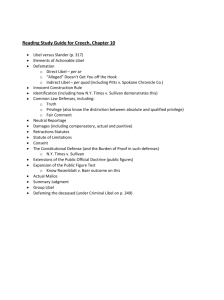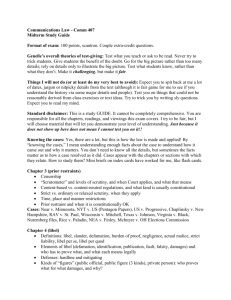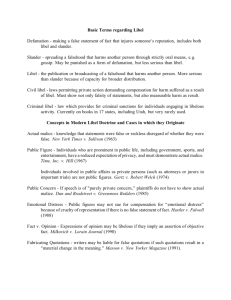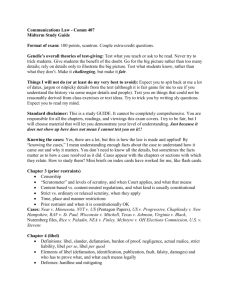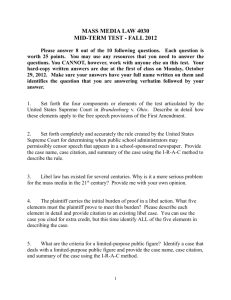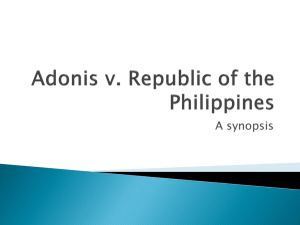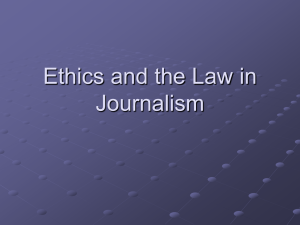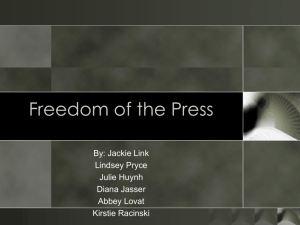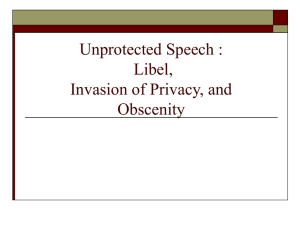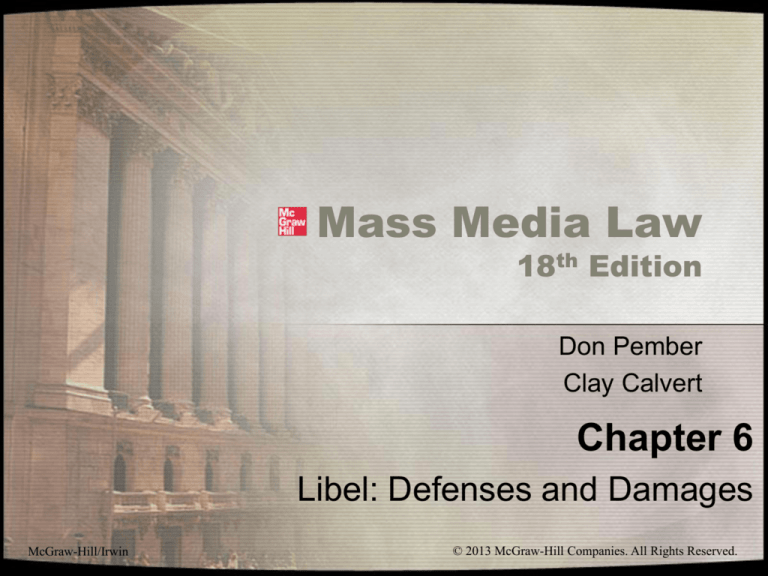
Mass Media Law
18th Edition
Don Pember
Clay Calvert
Chapter 6
Libel: Defenses and Damages
McGraw-Hill/Irwin
© 2013 McGraw-Hill Companies. All Rights Reserved.
Summary Judgment
A judgment is granted to a party in a lawsuit when
the pleadings and other materials in the case
disclose no material issue of fact between the
parties.
– All facts of the case must be agreed upon for a
summary judgment to be made.
6-2
Summary Judgment
Procedure for Summary Judgment:
1. Plaintiff makes initial written allegations to the court
2. Defendant may argue for a summary judgment if:
• The plaintiff has failed to prove what is necessary
to sustain the libel suit
• There is a legal defense that blocks the suit
6-3
Summary Judgment
Procedure for Summary Judgment:
3. Court determines if a reasonable juror, acting
reasonably, could find in favor of the plaintiff
• If “yes” could find in favor of the plaintiff, case goes
to trial.
• If “no” could not find in favor of the plaintiff, a
summary judgment is granted.
6-4
Statute of Limitations
A law that requires that a legal action must begin
within a specified period of time.
– For libel, statutes of limitations vary from state to
state.
– Most often one or two years.
6-5
Statute of Limitations
In a libel action, a statute of limitations begins
when:
– The material is published or broadcast for the first
time.
– Magazines are distributed to a substantial portion of
their audience, not the date printed on the publication.
6-6
Jurisdiction
A libel suit can be brought in any state in which the
libel has been circulated regularly
– Venue Shopping – choosing a state that has laws
favorable to your legal action
– Keeton v. Hustler (1984)
6-7
Jurisdiction and the Internet
• The U.S. Supreme Court has passed on at least three
cases involving libel jurisdiction and the Internet.
• Lower courts are still sorting out where Internet-based
libel suits can or should be heard.
• Typically, jurisdiction questions are based upon where the
message content was aimed, where harm was caused,
and where message was downloaded.
6-8
Truth
Privileged Communications
• Absolute Privilege—immunity from libel suits
granted to government officials and others based
on remarks uttered or written as part of their
official duties.
– Includes communication and documents from
legislative, judicial and executive branch officials and
proceedings.
6-9
Truth
Privileged Communications
•Qualified Privilege
– A media outlet is protected by qualified privilege if:
• The material comes directly from the report of a
privileged proceeding or document.
• The material is a fair and accurate summary
published or broadcast as a report of the
proceedings or documents.
– Official portion of legislative proceedings, judicial
proceedings and executive actions are generally
privileged.
6-10
Privileged Communications
Neutral Reportage
– When the press reports newsworthy but defamatory
allegations made by a responsible and prominent
sources, these reports may be privileged. The
charges must be reported accurately and neutrally,
and must be about a public official or public figure.
– This is not a viable defense in most jurisdictions.
6-11
Protection of Opinion
Rhetorical Hyperbole
– Language so expansive that the reader or listener
knows it is only an opinion, and that it is not an
assertion of fact.
• The tone of the language is usually key, and this
can be difficult to establish.
6-12
Protection of Opinion
• “Pure Opinion” and the First Amendment
– The Supreme Court’s Milkovich ruling (1991) stated
that pure opinion is a statement incapable of being
proven true or false.
– Majority of lower courts have subsequently indicated
dissatisfaction with this standard, suggesting that the
criterion is far too conservative.
6-13
Protection of Opinion
The Ollman Test
1. Can the statement be proved true or false?
2. What is the common or ordinary meaning of the
words?
3. What is the journalistic context of the remark?
4. What is the social context of the remark?
6-14
Protection of Opinion
Fair Comment and Criticism
–
This common law defense for opinion worked for
several centuries, but is currently in legal limbo.
–
Fair comment defense requires three-part test:
1. Is it an opinion?
2. Is it a subject of legitimate public concern?
3. Is there a factual basis for the comment?
6-15
Protection of Opinion
Tips On Avoiding Opinion-Based Libel Suit
–
Attorney David Utevsky suggests:
•
•
•
•
Make it clear that opinion is being stated.
Don’t rely on protection of journalistic context.
Clearly summarize facts providing basis for
opinion.
Make certain facts are true.
6-16
Defenses
Consent
– An individual cannot sue for libel if he or she explicitly
consented to publication of the defamatory material.
– Indirect or implied consent is constructed on sound
legal theory, but only a handful of courts have
accepted this theory.
6-17
Defenses
Right of Reply
– Right of reply is sometimes called the “self-defense.”
– If an individual has been libeled, he/she may answer
the defamation with a libelous communication and not
be subject to a successful libel suit.
– The reply must be equal in magnitude and effect.
– Not accepted by many courts.
6-18
Damages
Actual Damages
– Actual damages are damages for actual injury:
•
•
•
•
•
to reputation
standing the community
monetary loss
personal humiliation
mental suffering and anguish
6-19
Damages
Special Damages
– Special damages are specific items of pecuniary loss
caused by published defamatory statements.
– This is most common in trade libel.
6-20
Damages
Presumed Damages
– Presumed damages are damages that a plaintiff can
receive without proof of injury or harm.
6-21
Damages
Punitive Damages
– Punitive damages punish the defendant for
misconduct and warn others not to act in a similar
manner.
– The damage awards are usually very large, and thus
lawyers frequently term them the “smart money.”
6-22
Retraction Statutes
Retractions
– A retraction is a statement published to retract or
correct previously published libelous material.
– 33 states have retraction statutes.
– Under a typical retraction statute, a publisher must be
given an opportunity to retract a libelous comment
before a suit can begin.
6-23
Criminal Libel
Criminal Libel and State Intervention
– Founded on the theory that the state should
sometimes act on behalf of the injured party of the
libel and bring criminal charges against the
defendant.
– In 2009, only 16 states had criminal libel laws on the
books.
6-24
Criminal Libel
Differences From Civil Libel
– You may criminally libel the dead.
– You can be charged with criminal libel if you provoke
a breach of the peace.
– Garrison v. Louisiana (1966) was a potent blow
against criminal libel.
6-25

